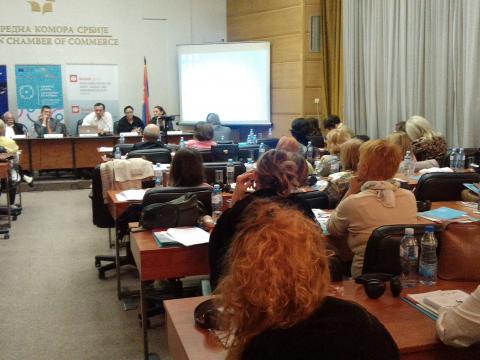Building a better world for children in Serbia starts with dialogue

By Tijana Moraca, Program Manager, World Vision Middle East Eastern Europe Regional Office/ AgroInvest Foundation
On Oct. 14, 2014 more than 75 government officials, public institutions staff, Austrian experts, current and former politicians, development professionals, community service organisations (CSOs) and citizens came together to discuss how to make the world a better place for children through services as well as policy.
The conference was structured around four panel discussions that put ministry representatives on equal footing with local service providers and service beneficiaries giving them the opportunity to have open and honest dialogue. The main topics that were discussed included:
- Decentralization: division of responsibilities between local and national levels of government.
- Sustainability of local services and measures for children.
- Intersectorial coordination and cooperation on the local and national levels.
- Citizens associations as community service providers.
Although the event was dedicated to child wellbeing, it did not focus on any specific group of vulnerable children or technical expertise, but rather looked at more structural issues and the broader context in which child welfare reform in Serbia is taking place. One specific example is the issue of decentralization. While the quality of decentralization is central to determining the value of care and support provided to vulnerable children, it is almost never discussed at child well-being events, especially events where all parties (local and national government officials as well as local service providers) are present.
A second topic which is often taboo is that of sustainability of services established through donor funded projects. While we would all like to believe that all programmes that benefit the vulnerable population continue forever, it is not always true. In fact, in many cases where local governments are expected to absorb the ongoing project costs, the projects are forced to suspend operations. This has been especially true following the economic crisis. While this topic is often avoided, it is important to note that unstable service provision has a direct negative impact on the most vulnerable.
Finally, having local service providers and national leaders together and on equal footing gave the opportunity for local level professionals to speak directly to national level stakeholders and decision makers. Service providers were given the opportunity to share the challenges they face to provide and maintain services. Most importantly, however, parents of children who were beneficiaries of programmes that have closed were given the opportunity to share their opinions.
Maja Nesic, the mother of a girl with Cerebral Palsy, joined the conference to learn, but also to give a name and a face to why sustainability of services is of utmost importance.
“Participation in the conference meant a lot to me personally,” she said. “I had the opportunity to express my opinion and dissatisfaction with the lack of care for beneficiaries of services at the highest level. Without their support... none of the efforts for the most vulnerable groups will be sustainable, especially community-based services.”
RadomirJevtic, from the citizen association “Korak napred” reflected on his experience at the conference. “It is beautiful to cooperate with people and organizations dedicated to resolving real challenging issues and problems… My conclusion after the event is that in order to resolve problems in community service provision, a genuine and honest dialogue between public and civil sector is absolutely necessary,” he said.
This conference served to open many areas of discussion and debate. It was a good start, but the work is far from finished. World Vision in Serbia has already begun preparing for a follow-up conference that take place in February, 2015.
The conference was part of the project “Communities for Children: Networking for Community Child Oriented Model” conducted by World Vision Austria, Agroinvest Foundation Serbia and Open Club, in cooperation with Provincial Institute for Social Protection, supported by EU Delegation in Serbia, Austrian Development Agency and Office of attache for labour, social affairs and consumer protection of Republic of Austria (office of Federal ministry for labour, social affairs and consumer protection of Republic of Austria). The conference was additionally supported by World Vision’s Middle East and Eastern Europe regional office.